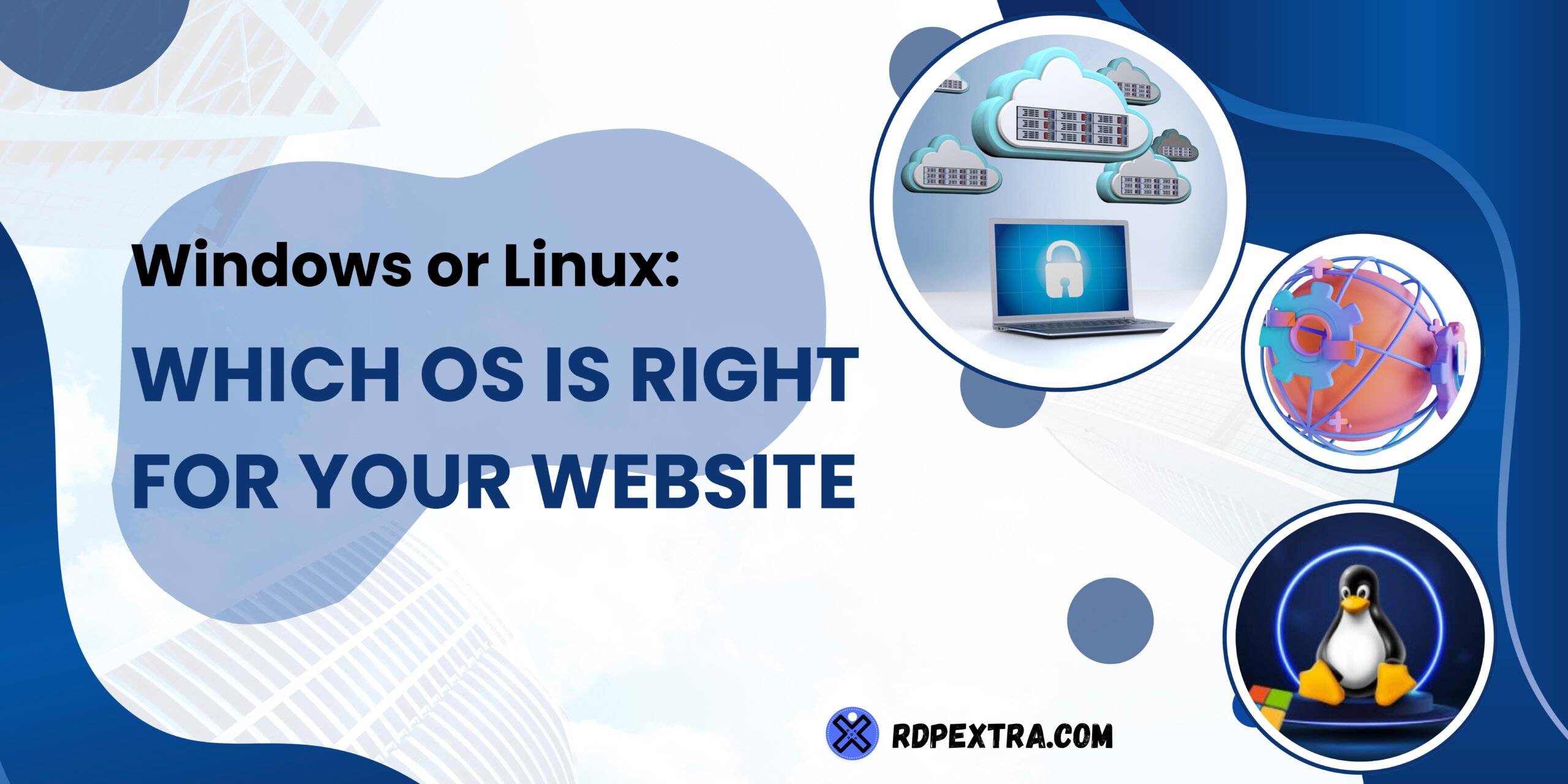

Windows vs Linux VPS: Which OS is Best for Your Website?
Which VPS is better for hosting? Choosing the right OS for your VPS is like picking the engine for a car: the body (your website) might look the same, but the engine determines fuel efficiency, speed, maintenance cost, and what roads you can drive on. Pick the wrong one and you either overpay or struggle with compatibility. Pick the right one, and deployment, scaling, and day-to-day maintenance feel effortless Windows VPS hosting Linux VPS hosting..
In this guide, you’ll get a practical, no-fluff walkthrough of Windows VPS hosting vs Linux VPS hosting, the actual tradeoffs, and a step-by-step checklist so you make the right choice for your website — not your neighbor’s.
TL;DR — Quick answer
- Use Linux VPS hosting for WordPress, PHP, MySQL/MariaDB, Nginx/Apache stacks, and when cost and performance per dollar matter.
- USA Windows VPS hosting if your website or app requires IIS, classic ASP/.NET Framework, or Microsoft SQL Server and Windows-specific integrations.
- If you’re using ASP.NET Core, you can run on Linux too (Kestrel + Nginx), so you’re not strictly locked to Windows.
Windows VPS hosting — When it’s the right fit
Pick Windows if you depend on Microsoft tech:
- ASP.NET (full .NET Framework) web apps, legacy .NET MVC VPS hosting for websites, applications, or apps that expect IIS features.
- Microsoft SQL Server features or integrations (particularly if you need specific MSSQL enterprise features).
- Active Directory or Windows-only middleware that ties into your app or intranet.
- You prefer GUI tools and Windows-style admin panels on the server.
Why? Which VPS is better for hosting Windows Server ships with IIS and tight Microsoft-stack integration (Visual Studio → deploy → IIS), which VPS hosting for websites reduces friction for teams built around Microsoft tooling. If your app was built with the Windows stack, choosing a Windows VPS cuts debugging and compatibility time.
Real cost note: Linux vs Windows VPS Windows licensing usually makes Windows VPS hosting more expensive than Linux hosting — factor that into monthly TCO.
Linux VPS hosting — Why most websites pick it
Linux is the default choice for web hosting because:
- The LAMP/LEMP Linux vs Windows VPS world (Linux, Apache/Nginx, MySQL/MariaDB, PHP) is the baseline for WordPress, Drupal, Joomla, Laravel, and many popular CMS platforms. There are battle-tested guides and a massive community.
- Lower licensing costs — most distributions are free and open source, which lowers hosting price and provider overhead.
- Performance and stability — Linux distributions are optimized for server tasks and are widely used in production for long uptimes and predictable behavior.
- Tooling & automation — package managers, shell tooling, containers, and orchestration are Linux-first in many ecosystems.
Bottom line: pick Linux for standard websites, e-commerce platforms (WooCommerce, Magento), modern stacks (Node.js, Python, Ruby), and when you want a better price/scale.
Head-to-head: the technical differences you actually care about
1. Web servers & stacks
- Windows: IIS (Internet Information Services), great for ASP.NET and Windows integrated auth.
- Linux: Apache, Nginx, and an ecosystem tuned for PHP, Node.js, Ruby, and Python. DigitalOcean and other hosts have ready LAMP/LEMP guides and tutorials for fast setup.
2. Languages and frameworks
- Windows wins for older .NET Framework, classic ASP, and Windows-dependent COM components.
- Linux wins for PHP, Python, Ruby, Node.js, Java, and containerized workloads. (Modern .NET — ASP.NET Core — is cross-platform; you can run it on Linux with Kestrel + Nginx.)
3. Databases
- MySQL/MariaDB/Postgres run everywhere (but are commonly paired with Linux).
- MS SQL Server runs best (and sometimes only) on Windows, though Microsoft provides Linux editions and managed cloud services. If you need specific MSSQL enterprise features, Windows hosting is simpler.
4. Control panels & admin experience
- cPanel — Linux only, widely used, friendly for shared hosting, and many WordPress users.
- Plesk — works on both Linux and Windows; often the panel of choice for Windows hosts.
5. Licensing & cost
- Linux: Generally cheaper — lower base OS licensing.
- Windows: Licensing fees can add up (OS + SQL Server + control panel + CALs). Always check provider pricing for Windows VPS hosting.
6. Performance & stability
- Linux distributions are widely regarded as lean for server workloads and are the default in many production fleets; Windows offers strong enterprise features but typically at higher resource overhead. (Tradeoffs depend on workload.)
Real-world scenarios: Which VPS OS is better for hosting your site?
- Simple WordPress blog or content site — Linux VPS hosting (LAMP/LEMP) for cost, speed, and plugin compatibility.
- WooCommerce / medium e-commerce — Linux for optimized caching stacks; Windows rarely adds value here.
- Enterprise .NET intranet app using AD and MSSQL — Windows VPS.
- Modern ASP.NET Core microservice — Best VPS hosting OS, either Linux (Kestrel + Nginx) or Windows; choose Linux if you want lower cost and container friendliness.
- SaaS built on Node.js/Express or Django — Linux because of tooling and container/CI support.
- Legacy app using COM or Windows-only drivers — Windows.
Future-proofing: .NET is no longer a Windows prison
A decade ago, choosing .NET meant picking Windows. Today, ASP.NET Core and Kestrel let you host .NET apps on Linux behind Nginx or Apache. That means you can often get the lower cost and stability of Linux while keeping your. Best VPS hosting OS NET code. Microsoft’s official docs cover Linux hosting with Nginx and Kestrel.
If your app is portable, prefer the environment that gives you the best combination of cost, ops familiarity, and scaling options (hint: containers + Linux are a winning combo for portability).
How to choose — a practical 7-step checklist (CoT-style reasoning you can run through)
- Inventory your stack — list frameworks, database engines, and third-party drivers. If anything is Windows-only, Windows VPS hosting is your short path.
- Ask about licensing — add expected OS and DB license costs to your monthly hosting budget (Windows usually costs more).
- Consider ops skillset — does your team prefer GUI management or shell automation? That can tilt you to Windows or Linux.
- Think about scale & containers — if you plan to containerize or use Kubernetes, Linux/containers are the most mature path.
- Check your control panel needs — cPanel (Linux) vs Plesk (Linux+Windows) can affect day-to-day admin ease.
- Test a small deployment — spin up a tiny VPS on both OSes and measure deploy time, backup/restore, and page load for your real app.
- Factor future migrations — if portability matters, use cross-platform frameworks or containerize early so OS lock-in is minimal.
Short decision cheat-sheet
- Need IIS or full MS stack → Windows VPS hosting.
- Need WordPress / PHP / open-source stack → Linux VPS hosting.
- Using ASP.NET Core → evaluate Linux first (lower cost), but you can use Windows if you need Windows-specific features.
Conclusion
There’s no mysterious “best” OS — there’s a best OS for your website. Most modern websites (WordPress, Node, Python, Ruby) run best on Linux VPS hosting for cost, performance, and ecosystem. Windows is the right choice for Windows-first stacks (classic ASP/.NET, MSSQL, AD integrations). If your app is portable (ASP.NET Core, containers), favor the option that gives you the lowest cost and simplest scaling path.
If you want my 7-step checklist as a one-page PDF to use when evaluating hosts and plans, grab it here: Invite readers to download our checklist.
